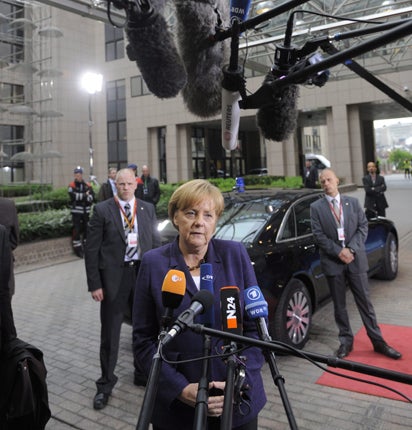Euro leaders try to stem panic as Greek crisis goes global
$20bn poured into Asian market as share values plunge from New York to Tokyo

Your support helps us to tell the story
From reproductive rights to climate change to Big Tech, The Independent is on the ground when the story is developing. Whether it's investigating the financials of Elon Musk's pro-Trump PAC or producing our latest documentary, 'The A Word', which shines a light on the American women fighting for reproductive rights, we know how important it is to parse out the facts from the messaging.
At such a critical moment in US history, we need reporters on the ground. Your donation allows us to keep sending journalists to speak to both sides of the story.
The Independent is trusted by Americans across the entire political spectrum. And unlike many other quality news outlets, we choose not to lock Americans out of our reporting and analysis with paywalls. We believe quality journalism should be available to everyone, paid for by those who can afford it.
Your support makes all the difference.European leaders moved last night to shore up confidence amid chaos on global stock markets as the Greek debt crisis looked like spiralling out of control.
Angela Merkel, the German Chancellor, Nicolas Sarkozy, the French President, and the leaders of the 14 other countries using the euro met for an emergency session but struggled to restore calm after weeks of dangerous indecision over whether or not to bail out Athens.
Stocks plummeted from Wall Street to Tokyo yesterday and the euro hit a 14-month low against the dollar. The US President Barack Obama spoke with Ms Merkel before she departed for the summit and was said to be monitoring the situation closely.
Finance ministers from the G7 held a conference call to discuss the Greek-inspired turmoil on financial markets. The Bank of Japan poured more than $20bn into Asian markets in a dramatic pre-emptive strike.
"This is a global issue," Japan's deputy finance minister, Rintaro Tamaki, told Bloomberg news agency. "All the financial markets are now in turmoil ... The impact of the Greek crisis has gone beyond the euro area."
The Australian Prime Minister, Kevin Rudd, warned that the markets had already judged the bailout "inadequate".
"I am holding my breath," said Paul de Grauwe, a leading economist at the University of Leuven. "A few months ago, we could have solved this by taking steps to stabilise the euro. But that didn't happen. The contagion has happened."
The Brussels summit had originally been called to rubber stamp the €110bn bailout loan to Greece, funded jointly with the International Monetary Fund, which was agreed last week to help the country ride out the storm and secure its debts over the coming two years. But last night it turned into a crisis-management session with eurozone leaders under huge pressure to issue a confidence-boosting statement.
"Everyone is very nervous. They realise they're on the edge of something major and that they must do something decisive," said an EU diplomat, likening the mood to the start of the financial meltdown in 2008.
Led by Berlin and Paris, Eurozone leaders pledged sweeping reforms, including closer scrutiny of national finances and penalties for countries that flout debt and deficit rules set out in the Stability and Growth Pact, which underpins the single currency. There are plans to create a mechanism to allow rapid action to prevent a new crisis and possible bold new initiatives such as the creation of a European Monetary Fund. But officials privately fretted that this was just a sideshow that will have little immediate impact.
Rattled investors are taking flight from the euro over fears that the lifeline loan will not be enough to prevent Greece from collapsing under its mammoth debt mountain and going bankrupt, dragging other eurozone nations with it. In the past days, the Greek problem has started to engulf Spain, Portugal and other countries using the currency. The contagion is seen as threatening the euro's survival and shaking the foundations of the European Union.
Ms Merkel lambasted speculators and said she is determined to win what she termed "a battle of the politicians against the markets".
Much will also depend on whether Greece's Socialist government can survive unrest following its drastic austerity measures. The prime minister, George Papandreou, said: "We've done our part but at the same time there's an unprecedented volatility in the world economy and that's why we're here today. We will reaffirm our confidence in our common economy."
Eurozone leaders were also at pains to stress that Spain and Portugal, which have been caught up the market maelstrom, were not the same as Greece. Analysts broadly agree that Portugal bears similar high debt and low growth. Spain's fundamentals are more solid but investors are worried by the huge corporate debt held by businesses such as banks and the bursting of the housing bubble. Even heavyweight economies like France run large debts and its banks, like those of Germany, are heavily tied up in Greek debt.
Join our commenting forum
Join thought-provoking conversations, follow other Independent readers and see their replies
Comments